The Bethel School District in Spanaway, Wash., is continuing to expand its fleet of propane autogas buses.
According to ROUSH CleanTech, which supplies its propane fuel systems for the Blue Bird Vision buses, the district began adopting propane autogas buses five years ago after a push from the superintendent, Tom Seigel.
“Propane made sense because we could add a propane fuel island at a much lower cost than compressed natural gas,” says Joel Stutheit, assistant director of the Bethel School District.
The district initially purchased 10 Blue Bird Vision buses equipped with ROUSH CleanTech’s propane fuel systems and has since increased its propane fleet to 32. In addition, it has nine more arriving this spring.
Each propane bus has replaced a diesel model, and the school district has taken advantage of available funding: One grant replaced two diesel buses, and another grant will help with future purchases.
The nine new 2019 Blue Bird Vision Propane buses will be equipped with engines that are 90% cleaner than the current most stringent heavy-duty engine standard by the U.S. Environmental Protection Agency (EPA), claims ROUSH. At the 0.02 ultra-low NOx level, it takes 10 propane autogas vehicles to emit as much NOx as one “clean diesel” vehicle, the company says.

“Bethel School District is the first school district to receive school buses that meet the absolute lowest optional NOx level on the market,” adds Stutheit. “We’ve lowered the carbon footprint of our school bus fleet with propane school buses and will continue our commitment to the community with these new buses.”
The district has also grown its propane fueling infrastructure along with its fleet. It started with bobtail refueling while a new transportation center was being built. The district then installed a fueling station with three 1,000-gallon tanks and two dispensers. Those tanks will be replaced this spring with a single 4,000-gallon tank, with room to add an additional tank when needed.
Overall, the school district has been pleased with its move to propane school buses, notes ROUSH.
“The district’s drivers like them because they’re quiet and don’t have the exhaust of diesel buses. The district likes them because of the efficiency and the low cost of repairs of the engine,” says Stutheit.







